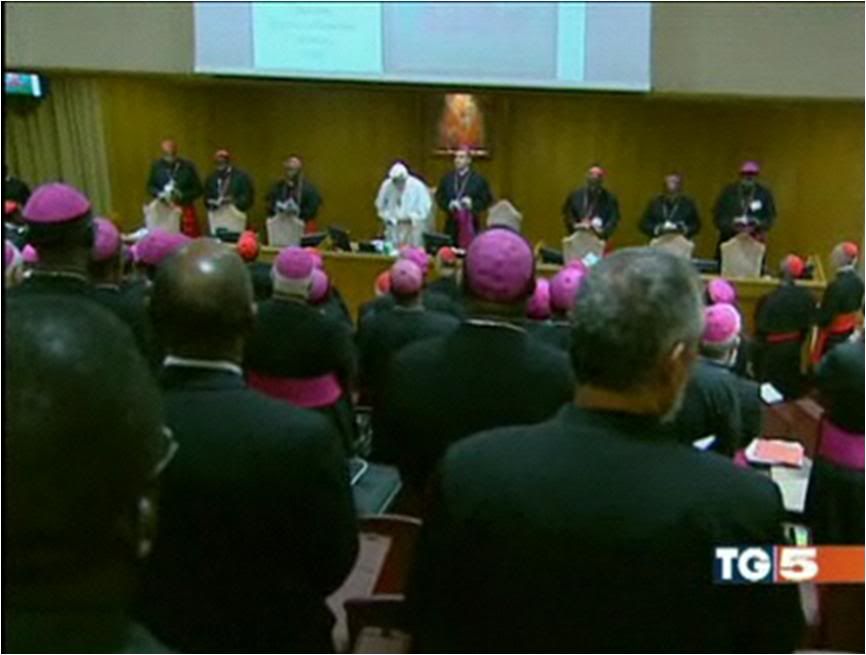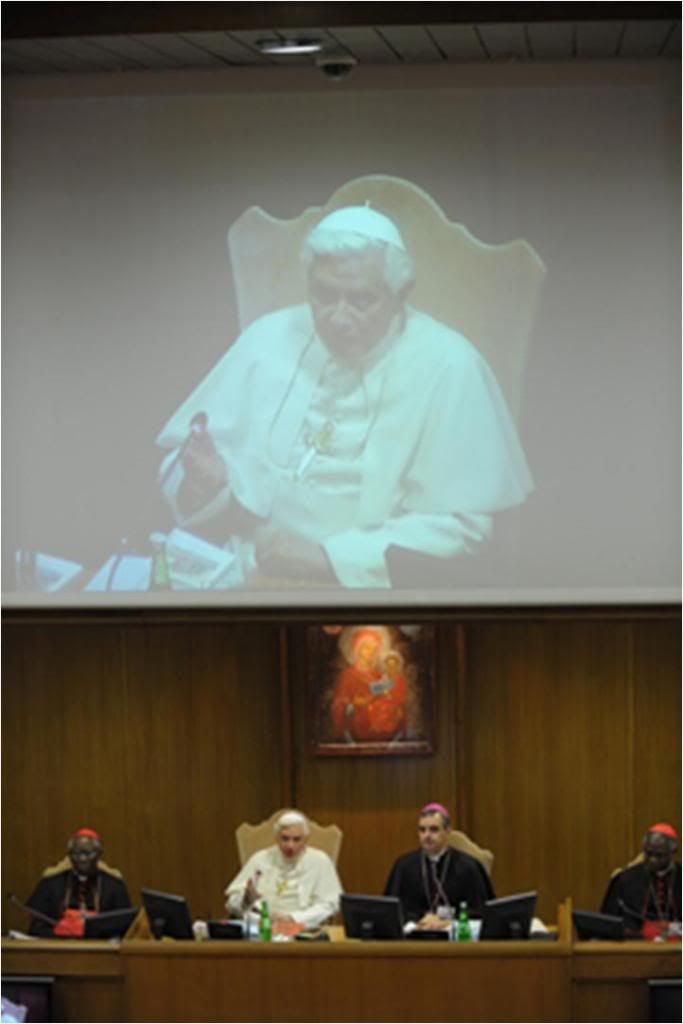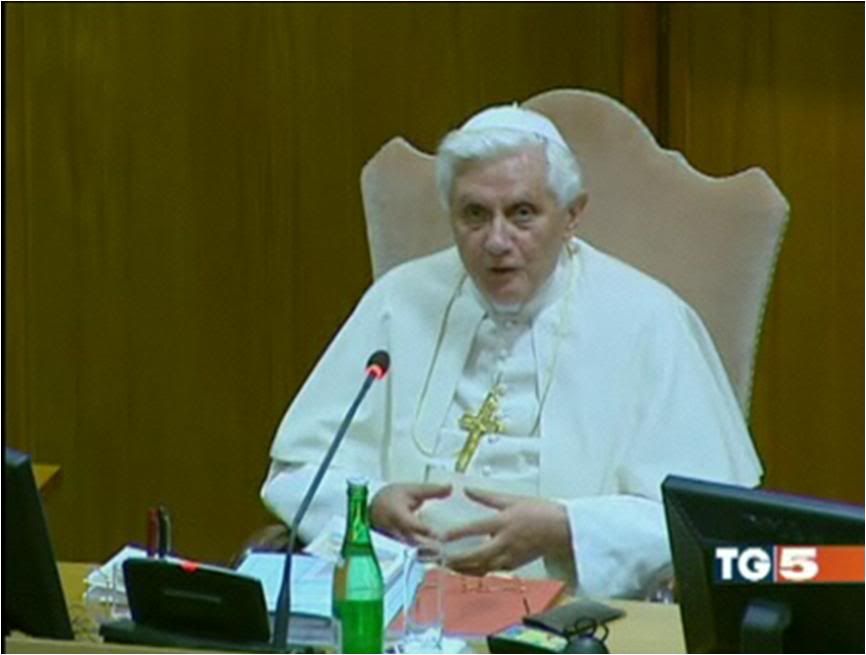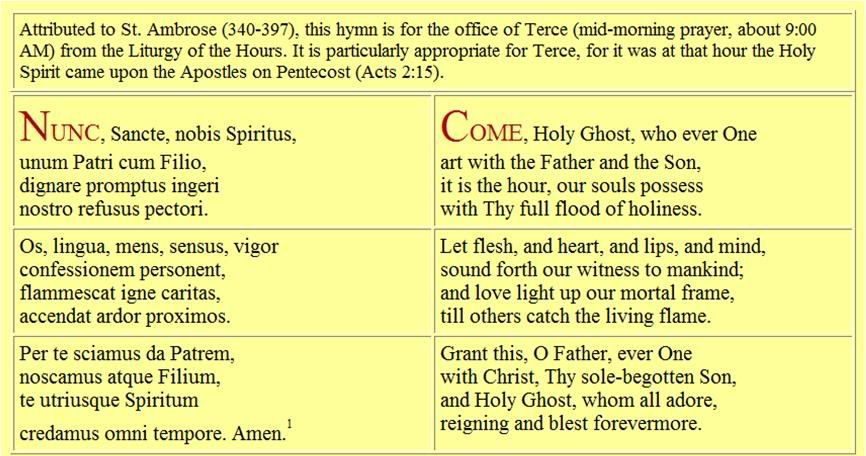| | | OFFLINE | | Post: 18.561
Post: 1.214 | Registrato il: 28/08/2005
Registrato il: 20/01/2009 | Administratore | Utente Veteran | |
|

 Unfortunately, the Bishops Synod daily bulletin has posted today's bulletin in all the other languages except English! Here first is what the bulletin says about the first working session.
Working sessions open
Translated from
Unfortunately, the Bishops Synod daily bulletin has posted today's bulletin in all the other languages except English! Here first is what the bulletin says about the first working session.
Working sessions open
Translated from


This morning, Monday, Oct. 5, at 9:00 a.m., the working sessions of teh Second Special Assembly for Africa of the Bishops' Synod started in the presence of the Holy Father at the Synod Hall of the Vatican.
The first general congregation of the assembly opened with the hymn Veni Creator Spiritus and the chanting of Terce from the Liturgy of the Hours.
The Holy Father then delivered a reflection.

Speaking of the action of the Holy Spirit, the Pope said that it is only thanks to his power that the Church can continue its work, and invoking him, he prayed that Pentecost does not remain an event in the past but that it may be re-created here and now.
He said the Church is not an organization but the fruit of the Spirit, directed towards the City of God under which all cultures are together.
It is precisely 'tongues of fire' that give the right words, he said, so that the Church may achieve true unity in plurality, collaborating in God's creative work.
He specified three words for reflection: confessio, caritas and prossumus. 'Confessio' is renewal and transformation, so that with God's light, reality can be seen, we can know ourselves and understand the realities of the world, and therefore be able to bear witness and to evangelize.
About 'caritas', the Pope reiterated that Christianity is not a collection of ideas nor a philosophy, and that one becomes Christian because of love. Citing the Gospel passage about the good Samaritan, the Pope said charity is universal and concrete.
And universality starts from love for one's neighbor, the 'prossumus'. The love that comes from the Holy Spirit, he said, calls us to active responsibility for our neighbor, which then becomes universality in service to the world.
Presiding at the first congregation was Cardinal Francis Arinze, emeritus prefect of the Congregation for Divine Worship, one of three presidents-delegate named by the Pope.
He delivered a brief greeting to the participants, followed by a report from Mons. Nicola Eterovic, Secretary-General of the Bishops' Synod.
After the mid-morning break, the general moderator, Cardinal Peter Kodwo Appiah Turkson, Archbishop of Cape Coast (Ghana), delivered introductory remarks.
This was followed by an open discussion.
The First General Congregation concluded at 12.25 with the Prayer of the Angelus Domini led by the Holy Father.
There were 226 Synodal Fathers present.
The Second General Congregation takes place this afternoon at 4.30 p.m. for the Reports on the five Continents.
Here is a translation of the reflection offered by the Holy Father at the first General Congregation:

Dear brothers and sisters,
We have now begun our synodal encounter, calling on the Holy Spirit, knowing full well that at this time we cannot achieve what must be done for the Church and for the world: only with the power of the Holy Spirit can we find that which is right and accomplish it.
And every day we will begin our work by calling on the Holy Spirit with the Prayer of the Hour of Terce [ 9:00 Morning Prayer in the Liturgy of the Hours, the third Prayer of the day] , “Nunc sancte nobis Spiritus”.
Therefore I would like to meditate briefly now, together with you all, on this hymn, which opens the work of every day, now during the Synod, as well as in our daily life.
“Nunc sancte nobis Spiritus”. We pray that the Pentecost may not only be an event of the past - the beginnings of the Church - but that it may also be today, now.
“Nunc sancte nobis Spiritus”. Let us pray that the Lord accomplish the effusion of His Spirit now and re-create anew his Church and the world. We recall that the apostles after the Ascension did not begin - as would have been usual - to organize, to create the Church of the future.
They waited for God’s action, they waited for the Holy Spirit. They understood that the Church cannot be 'made', that it is not the product of our organization: the Church must be born of the Holy Spirit. Just as the Lord himself was conceived and born of the Holy Spirit, the Church must also be conceived and born of the Holy Spirit.
Only through this creative act of God can we enter the activity of God, into divine action, and collaborate with Him. In this sense, even all of our work at the Synod is a collaboration with the Holy Spirit, with the power of God that precedes us.
And we must always continue to implore the fulfillment of this divine initiative, in which we can become collaborators of God and contribute so that his Church may be reborn anew and grow.
The second verse of this hymn - “Os, lingua, mens, sensus, vigor, / Confessionem personent; / Flammescat igne caritas, / accendat ardor proximos” - is the heart of this prayer. [Let flesh, and heart, and lips, and mind,/ sound forth our witness to mankind;/ and love light up our mortal frame,/ till others catch the living flame.]
We beg God for three gifts, the essential gifts of Pentecost, the gifts of the Holy Spirit: confessio, caritas, proximos.
Confessio: the tongue of fire that is “reasonable”, it gives us the correct words and makes one think about overcoming Babel on the day of Pentecost. The confusion born from man's selfishness and pride, the effect being the inability to understand each other, must be overcome by the force of the Spirit, which unites without making everyone uniform, which gives unity in plurality: each can understand the other, even in the diversity of their languages.
Confessio: the word, the tongue of fire that the Lord gives us, the common word which unites us all - the City of God, the Holy Church - in which all the wealth of our different cultures is present.
Flammescat igne caritas. [That love may light us up...] This confession is not a theory but life, love. The heart of the Holy Church is love, God is love and communicates Himself to us by communicating love.
And finally, the proximos (neighbor). The Church is never a group closed in on itself, which lives for itself like so many of the groups existing in the world. Rather she is distinguished by her universal charity, her responsibility for the neighbor.
Let us consider these three gifts one by one.
Confessio: in the language of the Bible and the early Church, this word had two essential meanings, which might seem opposed but in fact, constitute one reality.
Confessio, first of all, is the confession of sins: to recognize our faults and to know that before God we are wanting, we are at fault, we are not in the right relationship with Him.
This is the first point: to know ourselves in the light of God. Only in his light can we know ourselves, can we also understand what evil tehre is in us, and thus see how much must be renewed, transformed. Only in the light of God can we know each other and truly see all of reality.
I feel that we must keep in mind all this in our analysis of reconciliation, justice, peace. Empirical analyses are important - it is important to know exactly the reality of this world. However these horizontal analyses, though made with exactitude and competence, are insufficient. They do not indicate the real problems because they are not seen in the light of God.
If we cannot see that at the root of everything lies the Mystery of God, then the matters of the world do not go well, because the relationship with God is not in order. And if the first relationship, the fundamental one, is not correct, all other relationships, no matter how good they may be,will basically not work.
Therefore all our analyses of the world are inadequate if we do not look deeper, if we do not get to the point where we consider the world in the light of God, if we do not discover that at the root of injustice, of corruption, there is a heart that is not upright, that is closed to God, and, therefore, a falsification of the essential relationship which is the foundation of all others.
Confessio: to understand the realities of the world in the light of God, the primacy of God, and finally, human existence itself and human realities, which must be oriented towards our relation with God. And if this is not right, if it does not reach the point that God wants, does not enter His truth, then all the rest cannot be corrected, because all the evils will re-emerge to destroy the social network and peace in the world.
Confessio: to see reality in the light of God, to understand that ultimately our realities depend on our relationship with our Creator and Redeemer, and thus lead to truth, the truth that saves.
Saint Augustine, referring to Chapter 3 of the Gospel of Saint John, defines the act of Christian confession as “to make truth, to go towards the light”. Only by seeing our faults in the light of God, the insufficiencies in our relationship with Him, can we walk in the light of truth. And only truth will save.
Finally, we work in truth: to really confess in the depth of God’s light is to make truth. This is the first meaning of the word confessio - confession of sins, recognizing the guilt that results from a lack of relationship with God.
However a second meaning of confessio is to thank God, to glorify God, to bear witness to God. We can recognize the truth of our being because there is a divine answer. God has not left us alone with our sins: even when our relationship to his majesty is blocked, He does not turn away, but comes to us and takes us by the hand.
Therefore confessio is a testimony to God’s goodness, it is evangelization. We could say that the second dimension of the word confessio is identical to evangelization.
We can see this on the day of Pentecost, when Saint Peter, in his speech, on one hand names the sin that has been committed - you killed Him who is holy and just - but, at the same time, he says: this Holy One has risen and loves you, embraces you, calls upon you to be His in contrition and baptism, as well as in communion with His Body.
In the light of God, to confess necessarily becomes proclaiming God, to evangelize and thus renew the world.
The word confessio however reminds us of another element. In Chapter 10 of the Letter to the Romans, Saint Paul interprets the confession in Chapter 30 of Deuteronomy. In this text, it would seem that the Jews, entering the definitive form of the covenant, in the Holy Land, were fearful and could not really respond to God as they should have done.
The Lord tells them: do not be afraid, God is not far. To reach God it is not necessary to cross an unknown ocean, there is no need for space travel in the heavens, for complicated and impossible things.
God is not far, He is not on the other side of the ocean, in the immense spaces of the universe. God is close. He is in your heart and on your lips, with the word of the Torah, which goes into your heart and is proclaimed from your lips. God is in you and with you, He is near.
Saint Paul substitutes, in his interpretation, the word Torah with the words confession and faith. He says: truly God is close, there is no need for complicated expeditions to reach Him, nor for spiritual or material adventures. God is close - with faith, He is in your heart, and with confession, He is on your lips. He is in you and with you.
Truly, Jesus Christ with His presence gives us the word of life. Thus He enters, in faith, into our heart. He lives in our heart, and in confession, we bring the reality of the Lord to the world in our time.
I think this is a very important element: God is close. Things of science, of technology, require great investments: spiritual and material ventures are costly and difficult. But God gives Himself freely. The greatest things in life - God, love, truth - are free. God gives Himself to our hearts.
Indeed, we should often meditate on the free and generous giving of God: there is no need for great material or even intellectual gifts to be close to God. God gives Himself freely in His love: He is in me, in my heart and on my lips.
This is the courage, the joy of our life. It is also the courage present in this Synod, because God is not far: He is with us with the word of faith.
I think that even this duality is important: the word in the heart and on the lips. This depth of personal faith, which truly ties me intimately to God, must then be confessed: faith and confession, interiority in communion with God, and the testimony of faith that is expressed on my lips, athat thus becomes sensed and present in the world. These two important things always go hand in hand.
The hymn we are talking about even indicates the places where confession can be found: “os, lingua, mens, sensus, vigor”. All our abilities of thinking, speaking, hearing, acting, must resound with - the Latin uses the word “per-sonare” [resound through] - the word of God.
Our being, in all its dimensions, should be filled with this word, thus sensitizing the world, and through our existence, echoes in the world: the word of the Holy Spirit.
Then briefly, the two other gifts. Charity: it is important that Christianity is not a collection of ideas, a philosophy, a theology, but a way of life.
Christianity is charity, it is love. Only thus can we become Christians: if faith turns into charity, if it is charity. We could also say that logos and caritas go together. Our God is, on the one hand, logos, eternal reason. But this reason is also love. It is not cold mathematics that creates the universe, it is not a demiurge.
This eternal reason is fire, it is charity. This unity of reason and charity, of faith and charity, should be realized within us, and thus, transformed in charity, we become, as the Greek Fathers would say, 'divinized'.
I would say that in the development of the world, we have been making this ascent, from the first created realities to the human creature. But this ascent is not done. Man must be divinized to fulfill himself.
The unity of the creature and the Creator: this is true development, to arrive to this openness with the grace of God. Our essence is transformed to charity. If we speak of development, we must always think of this last goal, which God wants us to reach with him.
Finally, the neighbor. Charity is not an individual thing, but a universal and concrete thing. Today in the Mass, we proclaimed the Gospel page on the Good Samaritan, where we can see the dual reality of Christian charity, as universal and concrete.
This Good Samaritan meets a Jew, who is therefore outside the boundaries of his tribe and his religion. But charity is universal, and therefore he considers this stranger as his neighbor in all senses.
Universality opens the limitations that close the world and create differences and conflicts. At the same time, the fact that something must be done universally is not a philosophy but a concrete act.
We must proceed towards this unification of universality and concreteness - we must truly open the boundaries between tribes, ethnic groups, and religions to the universality of God's love. Not just in theory, but in the places of our life, with all the necessary concreteness.
Let us pray to the Lord to give us all this, in the power of the Holy Spirit. Ultimately, the hymn is a glorification of the Triune and One God, a prayer of knowing and believing. Thus the end returns to the beginning.
We pray that we may learn, that learning becomes believing, and believing becomes loving, action. We pray the Lord that He may give us the gift of the Holy Spirit, that he may inspire a new Pentecost, and help us to be His servants at this time in the world. Amen.

[Modificato da TERESA BENEDETTA 07/10/2009 07:38] |